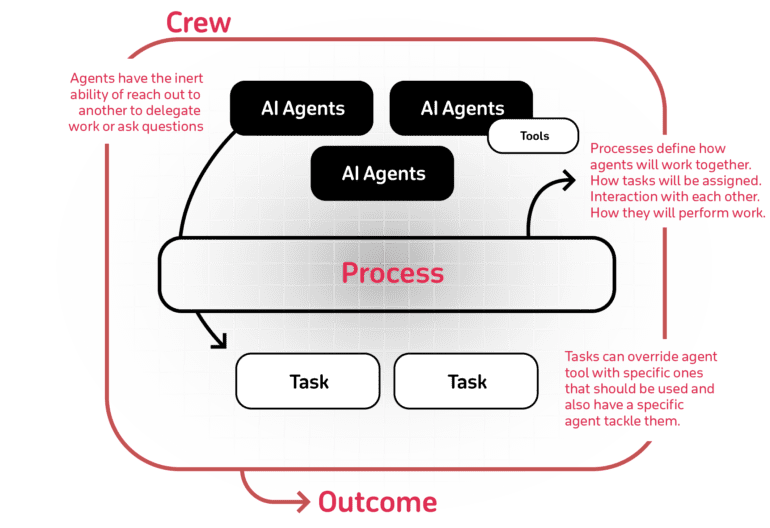TL;DR:
- CrewAI empowers AI agents to assume distinct roles and work seamlessly together, offering a dynamic and adaptable framework.
- Autogen and ChatDev, while strong in their own right, have limitations, such as complex programming and lack of customization.
- CrewAI’s role-based agent design facilitates autonomous inter-agent delegation and flexible task management.
- The framework’s support for various processes makes it highly adaptable to real-world scenarios.
- CrewAI enhances role-based agent effectiveness, autonomous delegation efficiency, and task management flexibility.
Main AI News:
In the realm of artificial intelligence, the ability to seamlessly integrate multiple AI agents is paramount for tackling intricate tasks. This collaborative intelligence is the cornerstone of intelligent assistant platforms, automated customer service solutions, and multi-agent research teams. While solutions like Autogen and ChatDev have made strides in this domain, they grapple with complexities in programming and lack the flexibility required for customization.
Autogen has made a name for itself by creating conversational agents adept at teamwork. However, its Achilles’ heel lies in the absence of a streamlined process concept, making it a challenge to efficiently orchestrate agents’ interactions, especially as the scope of tasks expands. On the other hand, ChatDev introduces the concept of processes but falls short in terms of adaptability and customization, rendering it less suitable for real-world applications demanding versatility and scalability.
Enter CrewAI, the cutting-edge framework poised to revolutionize AI collaboration. This innovative solution empowers AI agents to assume distinct roles, share common objectives, and function as a unified entity, much akin to a well-coordinated crew. CrewAI bridges the gap by melding Autogen’s conversational prowess with ChatDev’s structured process approach, offering a dynamic and adaptable framework tailored for both development and production workflows.
One striking feature of CrewAI is its role-based agent design, allowing for tailored customization of agents, encompassing specific roles, objectives, and tools. This unique capability enables autonomous inter-agent delegation, empowering agents to independently assign tasks and communicate with one another, thereby enhancing overall problem-solving efficiency. Moreover, the framework offers flexible task management, allowing tasks to be defined with customizable tools and dynamically assigned to agents.
The bedrock of CrewAI’s functionality lies in its support for various processes, with a current focus on sequential task execution. While Autogen and ChatDev have their merits, CrewAI excels in adaptability for real-world scenarios. Its methods are engineered to seamlessly integrate into diverse use cases, making it a game-changer in the realm of AI collaboration.
CrewAI’s prowess extends to role-based agent effectiveness, autonomous delegation efficiency, and overall task management flexibility. The framework’s capacity to accommodate a multitude of roles and facilitate independent task delegation significantly contributes to improved problem-solving metrics. Furthermore, its dynamic task management capabilities ensure the efficient execution of tasks, catering to the specific requirements of various scenarios.
Conclusion:
CrewAI’s innovative framework for collaborative AI is poised to reshape the market. By addressing the limitations of existing solutions and offering a dynamic blend of conversational abilities and structured processes, CrewAI empowers businesses to streamline operations, enhance problem-solving efficiency, and embark on a new era of AI-driven success. Its adaptability for diverse real-world scenarios positions CrewAI as a game-changer, ready to meet the evolving demands of the market.

